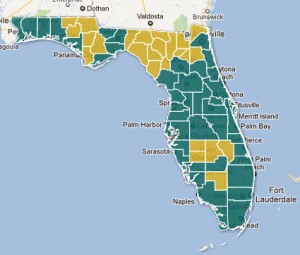Charters Not A Choice in Many Florida Counties

Matt Stiles / StateImpact Florida
More than one-third of Florida school districts did not have a charter school during the 2010-2011 school year. View an interactive map.
In Clay County, high school students can study aerospace, information or agricultural technology at one of twelve specialized academies.
But students in this suburban Jacksonville district can’t attend a charter school. There are none.
More than one-third of Florida’s 67 counties did not have a charter school during the 2010-2011 school year, according to a StateImpact Florida analysis of state data. Most of those counties are clustered between Pensacola and Jacksonville.
While the number of counties seems large, they represent just 5 percent of total state public school enrollment.
School and charter officials point to three causes:
- Many of the districts are small, rural and might not be able to support a charter. Charters got their start in traditionally low-performing urban neighborhoods and have spread to the suburbs.
- The district’s traditional public schools are good, reducing demand for an alternative. More districts are enticing students by offering innovative charter-like programs.
- Some school districts are setting a higher bar for approving charter applications. (More on that story tomorrow.)
“There Hasn’t Been That Many Applications”
It’s been 15 years since the first charter schools opened in Florida. These independently operated but publicly financed schools have steadily gained ground since then.
Charter schools in Florida enrolled more than 154,000 students last year, 5.8 percent of all public school students.
But charter school advocates say there are still too many barriers to opening a new school.
As charter schools have grown more popular, public schools have begun offering charter-like programs to compete.
With more than 35,000 students enrolled during the 2010-2011 school year, Clay County is the state’s largest district with no charter schools.
Clay County consistently earns an ‘A’ on state report cards, one reason school officials say there is little demand for charters. School board chairman Frank Ferrell said the board has denied all previous charter applications, but has not had a school apply in several years.
Four charter schools have applied in Clay County, but none of them have made it past the screening process for a school board vote. The district says they have received no complaints about the rejected charters.
“That might be an insight into why we don’t have any charters,” Ferrell said of the district’s performance. “Frankly, there hasn’t been that many applications for charter schools in Clay County.”
Clay County has also emphasized career-track academies that offer the types of specialized study that attracts students to charter schools. About 1,200 students are enrolled in a dozen academies that work as separate schools within Clay County high schools, according to Paul Parker, director of career and technical education.
Students attending one of the academies could head to the workforce after graduation or go on to college, Parker said.
Clay County is also offering its own online classes this year.
Rural Counties Still Left Out
Florida’s charter school laws are the tenth-strongest in the country, according to Alison Consoletti, a researcher with the Washington, D.C.-based Center for Education Reform.
“It depends on where they are. Charter schools tend to predominantly be based in urban areas.”
-Center for Education Reform researcher Alison Consoletti
But Consoletti said Florida’s one weakness is that charters can have a tougher time winning approval from local school boards. Other states allow universities or independent committees approve charter applications.
Charter schools started in Miami and state’s lowest-performing districts. Florida students generally have good access to charter schools, Consoletti said, but many small, rural counties just don’t have the demand to support a charter school yet.
“It depends on where they are,” Consoletti said of access to charters. “Charter schools tend to predominantly be based in urban areas.”
So do Clay County students have public school choices? Ferrell says yes.
“We are very sensitive to offering an educational track that is sensitive to (students),” Ferrell said, acknowledging the district feels competition from charter schools. “I’d much rather have that (state money) coming into the district than going to a third-party.”
Tomorrow we’ll look at districts that are tough on charter applications, and a push among charter operators to circumvent school board approval.

